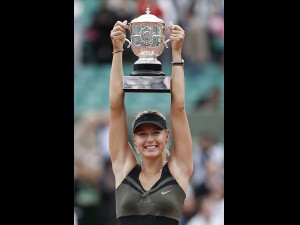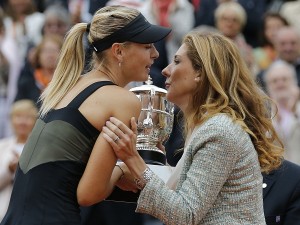Sharapova alone can’t save women’s tennis

Maria Sharapova of Russia holds the trophy after winning the women's final match against Sara Errani of Italy at the French Open tennis tournament in Roland Garros stadium in Paris, Saturday June 9, 2012. Sharapova won in two sets 6-3, 6-2. AP/Bernat Armangue
PARIS — It is tempting to say that the most entertaining moment in the women’s French Open final was when the stadium announcer fluffed her lines during the trophy presentation and mistakenly introduced the winner, Maria Sharapova, as the runner-up. Ho-ho, how the crowd laughed.
OK, that is mean. But, sadly, also not that far off the mark.
In terms of entertainment from tennis, there were those three drop shots Sara Errani neatly executed in the last game, merely delaying the inevitable defeat of the Italian who showed fight but not enough strength to unsettle the much taller Russian on the other side of the net.
And the aces — one served out wide, the other down the line — that Sharapova fizzed past Errani in that game to twice give herself championship points were impressive coming from a player whose right shoulder was in pieces not that long ago.
But otherwise, is that it? Is this the best women’s tennis can offer? Two weeks on the red clay of Roland Garros and Saturday’s lopsided final that flashed by in 89 minutes produced a feel-good comeback story with Sharapova’s return to the top of tennis and her first major title since 2008. But this French Open also threw up recurrent questions about why the sport’s elite women seem incapable, at least for the moment, of matching the spectacle produced time after time by the men.
In the men’s final on Sunday, the world No.1 — Novak Djokovic — will play the No.2 — Rafael Nadal. Simple, easy to understand and a mouthwatering prospect.
But on the women’s side, these Parisian weeks produced confusion, yet again. Big names, such as they are in women’s tennis these days, choked on the red dust. Li Na, China’s first major champion when she won the French last year, fell to an unheralded player from Kazakhstan, Yaroslava Shvedova, ranked 142nd and who only got to the main draw by playing in the qualifiers.
Thirteen-time major champion Serena Williams lost to Virginie Razzano, ranked 111th, a first-round shock that arguably produced the most absorbing women’s match of the tournament.
And Errani knocked out three past major champions — Ana Ivanovic, Svetlana Kuznetsova and Sam Stosur — on her way to the final. All this from a player who had never ended a season ranked higher than 42nd, had lost in the first or second round at 12 of her previous 18 major tournaments and had only once, in 38 tries, beaten a top 15 player before this trip to Paris.

Three-time French Open winner Monica Seles of the U.S., right, congratulates Maria Sharapova. AP/Michel Euler
Hierarchies, of course, are meant to be toppled. Martina Navratilova’s view is that the women’s game is in transition, away from the era of power tennis that Williams and her sister Venus used to overcome all-comers to a more all-around, nuanced game. That might be at least part of the explanation why a less physical player like Errani has had such an impact these two weeks.
Being just a big hitter “doesn’t cut it anymore. You have to have more. It’s making its way in the women’s side as well. You see a lot more variety, a lot more slices, drop shots, etc.,” Navratilova, the winner of 18 Grand Slam singles titles, said before this final.
“It’s nice to see that,” she added. “The rackets kind of changed the sport in a bad way for a while, but now I think it’s becoming a more all-round game.”
But another way to view Sharapova’s victory would be that she was merely the last player of any real renown left standing. There is some truth to that, too, but it doesn’t tell the whole story, because she beat the Wimbledon champion, Petra Kvitova, in the semifinals and only once lost a set in seven matches.
In winning 6-3, 6-2 on Saturday, Sharapova bullied Errani with her superior power, pounced on her soft serve, and fired forehand and backhand winners beyond the reach of the Italian who is 25 centimeters (9½ inches) shorter than the Russian. Errani switched to a longer racket this season to compensate for her lack of height, but it still wasn’t long enough against Sharapova.
This was the 11th straight year that the women’s French final has not needed a decisive third set.
And Sharapova reached the finals at Wimbledon in 2011 and the Australian Open this year, too, so there was nothing accidental about her appearance here.
And what grit. As Sharapova herself noted, she could have thrown in the towel in 2008 when a doctor diagnosed the torn rotator cuff tendon that had been giving her pain and trouble in her shoulder for months.
Instead, she studiously ignored — and has now proven wrong — all those who said that the surgically repaired shoulder would never allow the former No. 1 to be this potent again.
“I could have said, ‘I don’t need this. I have money; I have fame; I have victories; I have Grand Slams,'” she said after pocketing another 1.25 million euros ($1.6 million) for Saturday’s win.
“But when your love for something is bigger than all those things, you continue to keep getting up in the morning when it’s freezing outside, when you know that it can be the most difficult day, when nothing is working, when you feel like the belief sometimes isn’t there from the outside world, and you seem so small.”
Determined, rich and bankable, Sharapova is a fine ambassador for women’s tennis.
But her peers need to step up a gear, too. Because Sharapova can’t sustain interest alone.
___
John Leicester is an international sports columnist for The Associated Press.